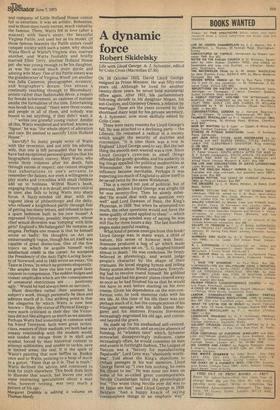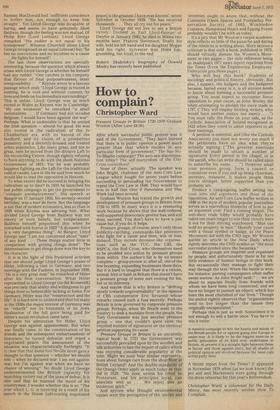A dynamic force
Robert Skidelsky
Life with Lloyd George A. J. Sylvester, editcd by Colin Cross (Macmillan £7.50)
On 19 October 1922, David Lloyd George resigned as Prime Minister. He was fifty-nine years old. Although he lived for another twenty-three years, he never held ministerial office again. After 1931, his parliamentary following shrunk to his daughter Megan, his son Gwilym, and Goronwy Owens, a relation by marriage. These are the years covered by the shorthand diary kept by his private secretary, A. J. Sylvester, now most skilfully edited by Colin Cross.
There were many reasons for Lloyd George's fall. He was attached to a declining party the Liberals, He remained a radical in a society which sought the security of doctrine and convention. "It is time there was a row in England" Lloyd George used to say. But the last thing the smooth men wanted was a row. Since Lloyd George's cynicism in small things offended the goody-goodies, and his audacity in big things appalled the political mediocrities at Westminster, his exclusion from power or influence became inevitable. Perhaps it was expecting too much of England to allow itself to be saved twice by the same Welshman.
This is a record not just of political, but of personal, decline. Lloyd George was alright till he was seventy-five. Then he slowly subsided."He would deal with one question very well" said Lord Dawson of Penn, the King's Physician, in 1939 "but when he attempted too much, the other questions would not have the same quality of mind applied to them" which is a nicely long-winded way of saying he was still fine for three hours a day. The last hundred pages make painful reading. What kind of person emerges from this book? Lloyd George was, in many ways, a child of nature. His sense of humour was basic. Someone produced a bag of air which made rude noises when sat on. "L. G. laughed himself almost to death." He was credulous. He firmly believed in phrenology, and would judge people's character by the shape of their craniums. He loved singing hymns and telling funny stories about Welsh preachers. Everything had to revolve round himself. He gobbled his food and had his guests' plates cleared away as soon as he had finished his so that he would not have to wait before starting on his next course. Given his dependence on the non-conformist vote, he took immense risks with his sex life. At this time of his life there was not perhaps much of it, but the complications of his 'triangular menage with his wife Dame Margaret and his mistress Frances Stevenson increasingly engrossed his old age, and continued beyond the grave. He made up for his unabashed self-centredness with great charm, and an entire absence of humbug. At "whiskey time" which, Sylvester somewhat disapprovingly indicates, came increasingly often, he would comment on men and events in forthright fashion. The League of Nations was a "factory for manufacturing flapdoodle". Lord Grey was "absolutely worthless". Told about the King's objections to certain passages in his war memoirs, Lloyd George flared up "I owe him nothing; he owes his throne to me." He was none too keen on some of his so-called great contemporaries. Neville Chamberlain failed the phrenological test. "The worst thing Neville ever did was to let Hitler see him" said Lloyd George in 1939. Baldwin "had a happy knack of saying commonplace things in an emphatic way". Ramsay MacDonald had "sufficient conscience to bother him, not enough to keep him straight". Yet Lloyd George was incapable of hating, and seems to have genuinely liked Baldwin, though the feeling was not mutual. Of Philip Kerr (Lord Lothian), Lloyd George remarked "His rudder is not equal to his horsepower". -Winston Churchill alone Lloyd George recognised as an equal (almost) but "he has no convictions and no loyalties to a cause . . . He fights for himself".
The last three observations are specially interesting, because the question which always arises with Lloyd George is whether he himself had any rudder. "One catches in his company that flavour of final purposelessness, inner irresponsibility . . ." Keynes wrote in a famous passage which ends "Lloyd George is rooted in nothing; he is void and without content; he lives and feeds on his immediate surroundings". This is unfair. Lloyd George was as much rooted in Wales as Keynes was in Cambridge. "My one weakness" he remarked "is small nationalities . . If Germany had not invaded Belgium, I would have been against the war". Perhaps. What is undeniable is that he settled the Irish question — almost for good. He was also rooted in the radicalism of the Jo Chamberlain era, with its hatred of the landlord, and its vision of a prosperous peasantry and a decently-housed and treated urban population. Like many great, and not so great, men he moved from the divisive Left to the reconciling Centre, though rightly refusing to have anything to do with the sham National Government of 1931. Yet he was probably happiest fighting on the Left for the traditional radical causes. Late in life he said how much he would like to lead the opposition in Heaven.
To what extent did he succeed in bringing his radicalism up to date? In 1935 he launched his last public campaign to get the government to "conquer unemployment". His speech at Bangor on 17 January 1935, his seventy-second birthday, was a tour de force. But the language is not that of modern economics, less so than in 1929 when Keynes was advising him. What divided Lloyd George from Baldwin was not theory or even beliefs, but temperament. Baldwin himself pinpointed this when he remarked with horror in 1922 "A dynamic force is a very dangerous thing". At Bangor, Lloyd George said "I am not concerned about "isms" of any kind . . These things matter little in comparison with getting .things done". The determination to get things done was the key to his character.
It is in the light of this frustrated activism that one should judge Lloyd George's praise of Hitler, following a visit to Germany, and two meetings with the Fuehrer, in September 1936. "He is a very great man" he remarked of Hitler after his first conversation. What Hitler represented to Lloyd George (as did Roosevelt) was precisely that ability and willingness to get things done so lamentably lacking at home. For Germany, Hitler was the "resurrection and the life". It is hard now to understand that for many in the 1930s the major interest of Germany was its "rebirth" not its treatment of its Jews. Realisation of the full price being paid for Hitler's social revolution came later.
Despite his admiration for Hitler, Lloyd George was against appeasement. But when war finally came, to the consternation of his friends and the subsequent embarrassment of historians, he turned defeatist and urged a negotiated peace. His assessment of the situation was characteristically forthright. "It is clear that that damn fool Neville never gave a thought to that question — whether we should win — when he declared war. I am not against war, but I'm against war when we have no chance of winning". No doubt Lloyd George underestimated the British capacity for snatching victory out of the jaws of defeat. It is also said that he misread the mood of his countrymen. I wonder whether this is so. "The post which L. G. is receiving as a result of his speech in the House [advocating negotiated peace] is the greatest I have ever known" wrote Sylvester in October 1939. "He has received thousands. . . They all cry out for peace."
Lloyd George did not live to see a British victory. Enobled as Earl Lloyd-George of Dwyfor in January 1945, he died in Wales two months later. Frances Stevenson, finally his wife, held his left hand and his daughter Megan held his right. Sylvester was there too, grumbling, but loyal, to the end.
Robert Skidelsky's biography of Oswald Mosley has recently been published.



































 Previous page
Previous page